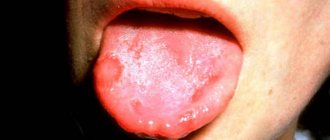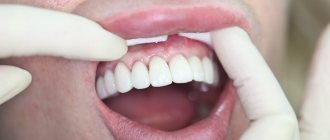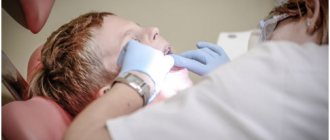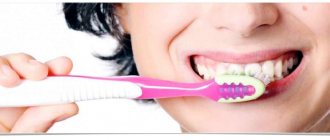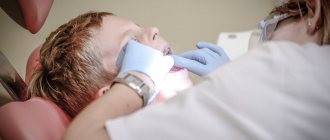Preparing children for dentistry: main problems
Young patients can be divided into three categories:
- The children have not yet been to the doctor, and the planned visit to the dentist will be the first.
- The first experience of communication turned out to be negative - the child is now afraid of the dental office and any manipulations.
- All previous meetings with the doctor took place in a positive direction, and the children have no negative emotions towards treatment.
If we talk specifically about fears, a child at the dentist may be afraid of:
- direct dental intervention - injections, drills, instruments;
- the doctor himself - rude attitude, sudden movements, appearance.
Any fear can be banished. Parents themselves can do this by patiently and thoughtfully relieving the child’s anxiety and correctly combining psychological communication techniques. Or through an adaptation visit to the dental clinic. In the second case, doctors who have undergone special education and training will deal with the child’s fears and show him that dental treatment is not scary.
The importance of prevention
Many mothers and fathers are subject to the mistaken opinion that it is not worth treating baby teeth at all, because their service life is very short and soon the baby teeth will be replaced by a permanent one. However, this belief is fundamentally wrong, since the formation of the rudiments of permanent teeth directly depends on the condition of temporary teeth. Caries or pulpitis in an advanced form can negatively affect the rudiments and lead to more serious dental problems in the future.
Teach children about oral hygiene
Therefore, it is extremely important to be on guard of the health of the baby’s teeth and gums from a very early age. Teach your child to perform thorough oral hygiene twice a day using a soft-bristled brush and toothpaste. For very small children, you can use special wipes or a fingertip designed to carefully remove deposits from the enamel surface. Consult your pediatric dentist about choosing an appropriate toothpaste. Make sure your baby's diet is rich in solid fruits and vegetables. Take your child to the dentist regularly for checkups.
Answering the question why children are afraid of dentists, it is worth noting that most often the parents themselves are to blame. Many adults still experience an overwhelming fear of the dental office, and excitement and anxiety are inevitably passed on to the baby. In this state, it will be very difficult to calm the child, so before going to the dentist, you should first deal with your emotions and experiences.
- According to the World Health Organization (WHO).
How to take your child to the dentist: secrets of persuasion
Preparing children for dentistry includes individual and general recommendations. Adults need to behave reasonably and adhere to certain rules:
- Treats a future meeting with a dentist calmly – as an everyday event.
- If you have your own negative experience, do not discuss it with your children - pleasant events and quality treatment are worthy of mention.
- On the day of the appointment, maintain a good mood for the child - avoid any conflicts, quarrels, and also do not focus on the future meeting with the doctor.
- Avoid deception, talk correctly about the dental clinic and procedures. If you cannot find the right words to explain the dentist’s actions, it is better to sign up for a preliminary adaptation appointment, where specialists will competently talk to the child.
- Schedule an appointment within the framework of the child’s routine - so that the baby does not want to sleep, eat, go for walks and does not have to cancel significant school or extracurricular activities.
- Feed before visiting the dentist - about an hour and a half.
The best algorithm for all ages is systematic visits to the dentist from the moment the first baby teeth erupt. Frequent appointments create a routine attitude, and routine examinations prove that there is nothing scary in the dental chair. If you go to the dentist when your teeth already hurt, you definitely can’t do without preparation.
Rodikova Tatyana
“A child who visits the dentist every six months is immediately visible. The patient confidently enters the office, climbs into the chair without embarrassment, and does not need to be persuaded. The examination takes place without whims or tears, in an atmosphere of jokes and good stories. By the way, I would like to note that the teeth of such children are usually fine - clean, well-groomed, healthy.”
General advice applies to everyone: both children and teenagers. But there are also separate recommendations for each age.
Use parental authority
Parents always remain the most authoritative people for a child. However, “demonstration” and “command” are very different things. Even adults love it when the boss gets involved in the work process, and does not engage in “seagull management” - he flew in, yelled and flew away.
It’s better to tell us about how you went to the dentist – and what benefits the visit brought you. Show your beautiful and healthy teeth, and explain that they were preserved only thanks to timely visits to the doctor.
Besides:
- Try to avoid scary words, mentions of injections, drilling and drills;
- Avoid focusing on the visit. Going to the doctor should be perceived as a routine event. Emphasizing importance, exclusivity, trouble - all these are tactics that will lead to fear in the child;
- Try role-playing a visit to the dentist. Let your child learn to sit correctly and keep his mouth open while you “examine” his teeth.
By the way, a good tactic would be to use other authoritative examples. If your child has a friend who recently went to the dentist, mention it. But it is advisable to do this shortly before the visit itself, so that during the game the children do not start telling each other various “horrors” such as huge ticks and creepy drills.
Another useful tactic is for the child to try on the role of a dentist himself. That is if you cured the teeth of a doll or some soft toy. Be present during this game to talk about how the examination and therapy are going. But, again, avoid using the words “prick”, “drill”, “drill” and so on.
First (repeated) trip to the dentist with a child 3-5 years old
Preparing a child for the dentist involves simple explanations of the doctor’s actions. Kids perceive the world through play, so the best ways to “talk” about reception are:
- game scenarios - examine the mouth of a soft hippopotamus, treat caries of baby teeth of a stuffed dog, play in the situation “a doll comes to the doctor”;
- various crafts and storytelling - make a tooth from plasticine and a harmful worm that is trying to damage the craft, or draw a “dirty” tooth and boldly erase the dirt with an eraser;
- watching cartoons - individual thematic tales about teeth and doctors, as well as series about visiting the dentist with your favorite cartoon characters;
- exciting teeth cleaning - during the process you can talk interestingly about the work of the doctor, removing dirt from teeth with a special vacuum cleaner and saving teeth from evil microbes.
If fear and mistrust persist, it is worth rescheduling the examination and making an initial introductory appointment. Having been in a beautiful office and touched all the tools, the baby will be imbued with confidence and will stop worrying.
Bargaining and leveling
If all this does not help, then you can promise the child a reward for courage and perseverance. If the baby behaves calmly, then after a visit to the dentist you can, for example, go to the zoo. Or buy an interesting book. Or just take a walk in the park.
Don't promise sweets or anything else. If a child gets a filling, he still won’t be able to eat for two hours after the procedure. Better - some kind of joint activity or hobby. And most importantly, keep your promise. Otherwise, the child’s stress will double – not only from the visit to the doctor, but also from lies from the parents.
Preparing a 5-8 year old child for dentistry
Age is not easy. Children already have their own opinions, ignore fairy-tale scenarios and have experience communicating with doctors. Even if the first visits to the dentist were successful, a preschooler may suddenly be afraid of a new visit.
Tips for parents:
- A detailed, correct story about the appointment - what the doctor will do, why you need to go to the dentist, what manipulations are possible.
- Authoritative opinion - dad, older brother or sister can talk about dental treatment, emphasizing the painlessness of the procedures and the friendliness of the doctors.
- Parents' trust - adults' emphasis on the fact that the doctor is wonderful increases the child's positive attitude.
Plaksina Margarita
“You shouldn’t ignore preparing for the reception of a schoolchild. Even with successful experience before! See for yourself. At the child’s previous appointment, for example, a baby tooth was removed. He did not cry and patiently endured dental procedures. But memories of slight discomfort could remain, and they could easily become the reason for refusing a new visit to the surgeon. Preparation will eliminate fear and help you communicate calmly with your doctor.”
Union with a doctor
A problem with a child’s teeth is a common problem for parents, the child and the doctor. Each of the participants in the process has their own tasks. But the treatment will take place and proceed normally if we combine efforts, therefore:
- Try to tell your doctor all the necessary information. Not only about health, but also about the child’s character: what he loves, what he does, what he dreams about, how you usually agree with him.
- Often when a child resists treatment, parents really want to help the doctor, but if you see that your actions are not helping, then give the doctor the opportunity to find contact with the child himself. Take on the role of observer.
- Be prepared for the fact that the doctor, after discussing the treatment plan and cost with you, will ask you to leave him alone with your child. Please be understanding about this. Moreover, according to our research, this is a fairly effective way to overcome problems in a child’s behavior.
To encourage or not: is it worth promising rewards after admission?
The issue of gifts for good behavior is controversial. Many psychologists advise avoiding such motivation, fearing future manipulations on the part of the child. However, there are two rules that will allow you to provide a positive reinforcement of experience and at the same time exclude a negative algorithm:
- Intangible reward. A visit to attractions, an interesting movie, or a relaxation in the routine will appeal to anyone and will leave positive emotions, enhancing the good impressions of a dental appointment or removing the negativity of a negative experience.
- Random present. Of course, a surprise will be planned, but the children don’t need to know about it. An unexpected trip to the cinema, buying a desired toy or book will lift your spirits and give you a boost of positivity.
The reward after a preventive examination or treatment is the decision of the parents. But dental clinic staff often hand out small gifts, certificates or memorable stickers to young patients, leaving a friendly reminder of the meeting.
From three to seven: let's talk!
Screenshot from youtube.com
Children from three to seven years old can already be interested and start a conversation with them. An excellent reason to start a conversation can be some piece of clothing, or a toy that the child took with him, or any little thing. I usually talk with our patients about animals - I tell them what kind of pets live at home, and share some funny stories.
There is no point in immediately explaining to your child what will happen to him now. It’s better to put everything in the format of a fairy tale.
We tell our patients a story about a microbe that settled in a tooth, for example. However, here you also need to not overdo it and monitor the reaction. After all, there are impressionable children - this microbe will appear in their dreams later. So sometimes you have to improvise.
Adaptation technique is the best preparation for a child
Unfortunately, the good intentions of adults to prepare a child for a visit to the dentist often end in failure. The random mention of words such as “pain”, “drill”, “prick” and the like terrify the child, depriving him of the ability to perceive constructive information. Also, many parents forget that the particle “not” is poorly perceived by children, so “it doesn’t hurt” and “it’s not scary”, kids hear exactly the opposite.
An alternative to unsuccessful dialogues is a professional approach. At an adaptation appointment - one or several - children will have a fun and educational experience in the dental world and learn the most interesting and kind things about it. Kids will no longer be afraid of dentists, schoolchildren will appreciate the friendly approach, and teenagers will gain confidence. The result of the meetings will be a positive perception of dentistry and a complete cure for dental phobia!




